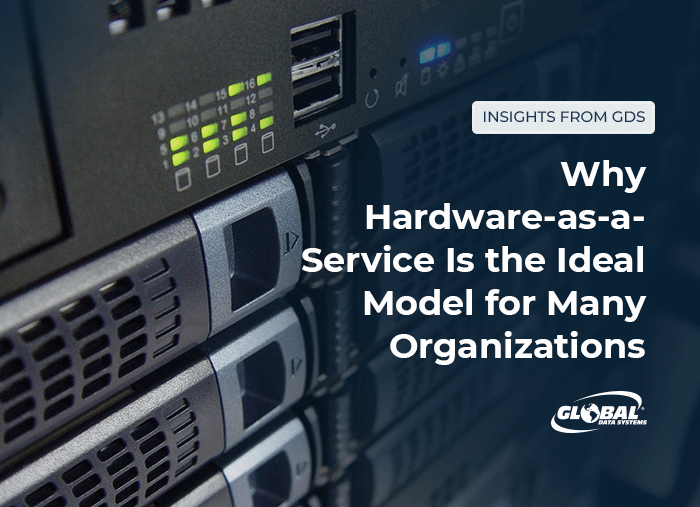Why Hardware-as-a-Service Is the Ideal Model for Many Organizations
Traditionally, the IT industry has focused heavily on hardware. Organizations purchased, implemented, configured and maintained an array of hardware assets, periodically upgrading them to take advantage of the latest technology. Despite the advent of the cloud and the growing emphasis on applications, many organizations still have a large fleet of IT hardware assets.

These assets range from PCs, laptops and mobile devices to networking gear, security appliances and storage platforms. When you add in printers, point-of-sale devices, desktop phones, and more, you see that organizations continue to labor under a heavy burden of hardware that’s costly to purchase and maintain. A large amount of investment capital is tied up in depreciating assets.
On top of that, upgrade cycles continue to accelerate. Organizations are finding that they must refresh some assets as often as every 18 months instead of three to five years. Organizations need a less burdensome and disruptive approach to full lifecycle management. This pain point has led to the rise of the Hardware-as-a-Service business model.
What Is Hardware-as-a-Service?
Because of these challenges, the Hardware-as-a-Service (HaaS) model is growing in popularity. The Hardware-as-a-Service business model allows organizations to obtain the hardware needed to support IT services in a consumption-based approach. Early Hardware-as-a-Service solutions focused on server and storage platforms. Today, Hardware-as-a-Service encompasses virtually every technology in the IT infrastructure stack. These offerings are also emerging for point-of-sale hardware, Microsoft Teams devices and even Logitech’s new “forever mouse” concept.
It is important to note that utilizing the Hardware-as-a-Service business model isn’t the same as leasing. The customer doesn’t have to obtain financing or worry about buying out the hardware at the end of a lease. It’s a true pay-as-you-go model that allows customers to consume what they need.
The Benefits of a New Approach to IT Hardware
This approach offers a number of benefits. The most obvious is the ability to preserve capital — organizations no longer face large outlays when it comes time to procure or upgrade hardware. A fixed monthly budget amount also gives the IT manager more flexibility when it comes to deploying new applications.
Hardware-as-a-Service (HaaS) reduces upfront costs and simplifies IT management, allowing organizations to scale and modernize infrastructure without the financial burden of hardware ownership.
Hardware-as-a-Service also enables organizations to take advantage of the latest technologies with lower risk and faster time to value. Total cost of ownership is reduced because there’s no need to overprovision hardware. Capacity can be adjusted up to down to meet changing requirements. HaaS is also more environmentally sustainable — services providers often repurpose, refurbish or recycle hardware to reduce electronic waste.
Getting Out of the Hardware Business
Best-in-class managed services incorporate HaaS, software and expert services in an end-to-end approach. These solutions deemphasize hardware, focusing on instead of the outcome to be achieved. They get customers out of the hardware business altogether, so they can allocate IT resources to initiatives that drive the business forward.
Take Firewall-as-a-Service as an example. These solutions include next-generation firewalls and a full suite of monitoring, maintenance and management services. Although the name includes the word “firewall,” the service is more about turnkey, fully outsourced border security. The emphasis is on the operational and service elements, which are aligned with the organization’s business needs and desired outcomes. Results are measured through service-level agreements and other metrics that are tied to clearly defined goals.
With these solutions, organizations can rapidly modernize and optimize their IT environment, eliminating legacy hardware and reducing technical debt. They gain a more reliable, flexible and secure infrastructure that enables the rapid adoption of new technologies.
Let GDS help you transform your IT strategy with Hardware-as-a-Service.
Contact Us >How GDS Can Help
The HaaS model is becoming popular for companies searching for new ways to service clients in a cutthroat market to acquire technology with little strain on their financial operations. The HaaS approach is more cost-effective for organizations who regularly repair or upgrade their physical equipment. This service is provided by a managed service provider (MSP) who offers inexpensive managed solutions and includes maintenance and support as part of the leasing agreement.
At GDS, we don’t just sell you hardware. As an award-winning managed service provider, we help you identify the best approach to achieve your business and IT objectives. We offer a suite of “as-a-Service” solutions that include industry-leading hardware, software, and our world-class managed services and support. These solutions encompass core IT infrastructure, security, communications and more, providing you with a one-stop shop for technology enablement.
Mordor Intelligence expects the HaaS market to see a compound annual growth rate of 28.7% through 2029. Key factors include the drive to adopt new IT solutions coupled with the need for a more cost-effective alternative to traditional maintenance, management and upgrades.
Let GDS help you get out of the hardware business and into a Hardware-as-a-Service approach. In doing so, you will achieve a more flexible, scalable and cost-effective IT environment. Contact our team of IT experts today to learn more about your options.
Benefits of Managed IT Services from Global Data Systems
- Strategic Managed IT: We help you solve your technology related business problems.
- Connectivity: We get you reliable, secure connectivity anywhere in the western hemisphere in 48 hours.
- Support: When you need help simply call our 24x7x365 support number.
- Billing: Instead of managing hundreds of vendors - get one, easy to read bill from GDS.
Contact Managed Services Provider, Global Data Systems >
Get In Touch
310 Laser Lane
Lafayette, Louisiana 70507
Office Hours: Monday - Friday
8 a.m. - 5p.m.
Contact Us >
24 / 7 / 365 Support
Our dedicated support
staff are available by
phone 24 hours a day.
Phone: 888-435-7986

